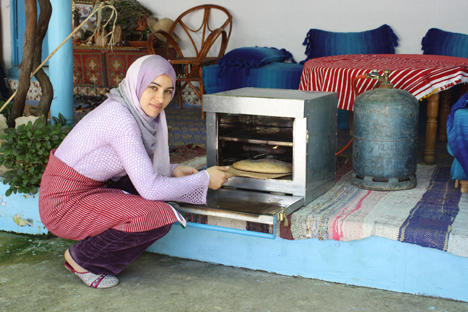
Environment and Biodiversity
Place
Tangier-Tétouan, Morocco
Sponsor
Alain Brighenti
Grant(s)
€15,000 to the Selection Committee at 2013/04/09
Project leader
Groupe Énergies Renouvelables, Environnement et Solidarités (Geres)
"This initiative helps conserve forest resources which have never been managed in the past, where anyone is free to use the resources as he pleases, and access is unrestricted."
Alain Brighenti
Groupe Énergies Renouvelables, Environnement et Solidarités (Geres), created in 1976, gathers together more than 200 collaborators around innovative sustainable development projects today, in France and in twelve developing countries. In partnership with local communities and players, the nonprofit provides development engineering and technical expertise to carry out projects in energy efficiency, the extension of energy services promoting local economic growth, the development of renewable energy systems, and waste upgrading.
Firewood: a necessary but gradually disappearing resource
Firewood is the second energy source consumed in Morocco. Nationwide, the absence of sustainable management of the resource is giving rise to a supply/demand imbalance of 3.1 million tons per year in energy-wood or two to three times the production capacity of the forests, which are losing more than 30 000 hectares every year.
The vast majority of rural households use firewood for their daily activities (cooking meals and baking bread, heating water and living space) with traditional equipment (bread oven, three-stone stove and braziers). These are low energy-efficiency units (5 to 10 %) and emit smoke that is harmful to the primary users: the women, for whom gathering wood is an arduous task and, most of the time, illegal (felling is prohibited, and only dead or fallen wood can be removed).
Low-efficiency, harmful equipment
The substitution of gas for wood for cooking meals can reduce the impact on the local biomass if this is not renewable. Despite an effort made by the Kingdom or Morocco to subsidize gas, this alternative remains limited by the rising cost of fossil energies and the snail-like improvement in living standards in the rural environment. This means the use of low-cost, inefficient, and unsafe units, emitting fumes that are damaging to the users. This option is therefore contingent on efficient, safe and harmless equipment, distributed on the basis of a viable economic model.
Participative resource management
The project initially aims to reduce firewood consumption by households by distributing individual energy-efficient units (improved gas burning bread ovens), designed by Geres and Planète Bois. The project then calls for setting up participative management of the surrounding firewood resource by forming a cooperative of fruit tree pruners and a forest cooperative (marketing, firewood collection, upgrading by drying, etc.). The project also helps improve the living conditions of the women by alleviating the arduousness of wood gathering and by making use of the time saved to further the establishment of income producing activities. Based on the processing and marketing of agricultural products, it demands the dynamization of an existing feminine farm cooperative.
Reinvigorating an economic activity and creating jobs
The direct beneficiaries are the 2 944 inhabitants of the protected areas of Bouhachem and Brikcha (Tangier-Tétouan region) and the project helps create some 15 direct jobs (9 pruners, 7 in the forestry cooperative, 11 bread oven saleswomen, 3 to 4 industrial jobs in the manufacture of the ovens), plus many indirect jobs: transporters for wood and for the bread ovens, women developing an activity by upgrading agricultural products.

